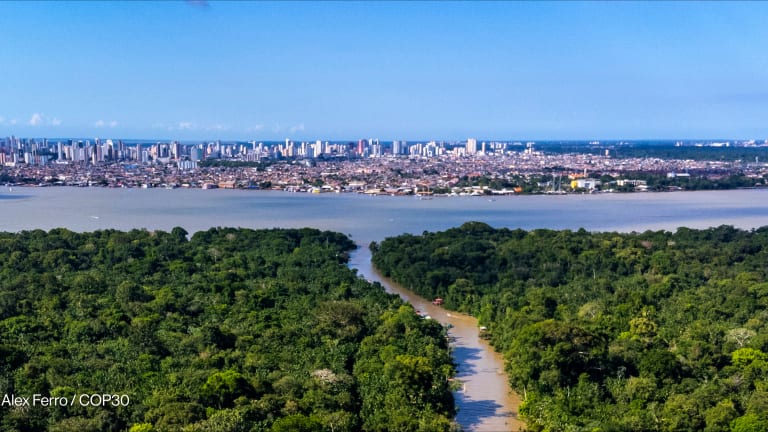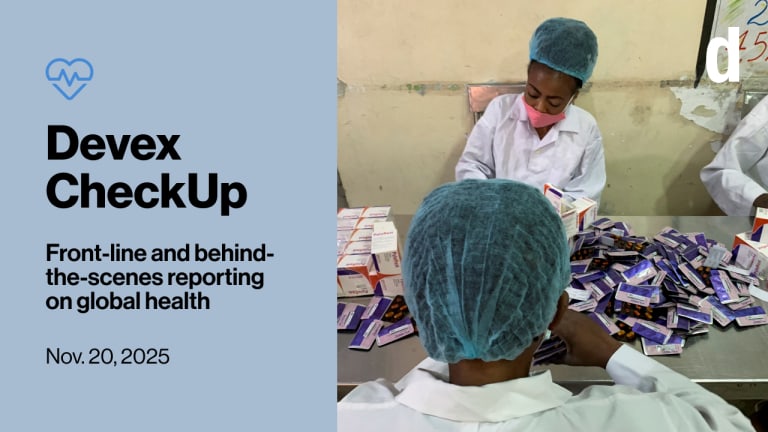Presented by Pivotal

Ibrahima Cheikh Diong took over the U.N.’s loss and damage fund with no staff and sky-high expectations. A year later at COP30, the fund is finally operational, launching its first call for proposals.
Also in today’s edition: Brazil and WHO’s road map, a $300 million commitment to speed up climate-health solutions, and Malawi’s historic abortion ruling.
A frantic first year
When Ibrahima Cheikh Diong took over the United Nations’ loss and damage fund last year, it barely existed. Weeks later, he was flying solo to board meetings in the Philippines and then straight to the 29th U.N. Climate Change Conference, or COP29, in Baku, Azerbaijan. “I was two weeks on,” he says. “No staff, just by myself … the expectations were so high.” It was, he jokes, “a what-have-I-gotten-myself-into” moment — but also a wake-up call. “It’s bigger than all of us … it’s about the countries we’re supporting.”
A year later at COP30, he’s back with a small secretariat and a fund that’s finally operational, launching its first call for proposals to help countries facing floods, wildfires, and sea-level rise. It begins with about $800 million — still far from what’s needed. As fund board member Elizabeth Thompson, also Barbados' extraordinary ambassador responsible for climate change, puts it: “To see it now becoming operational — it couldn’t have been imagined.”
Hard-won negotiations in Barbados produced the Barbados Implementation Modalities, including $250 million in grants for low- and middle-income countries, with applications opening in December. But critics say the pace and scale remain insufficient. “As we sit in Belém, devastating climate impacts are hammering Jamaica and the Philippines,” says activist Harjeet Singh. “They need help now.”
The board meets in the Philippines, while the secretariat sits at the World Bank in Washington, D.C., starting lean with nine staff and aiming for 25. Funds will be disbursed as grants only, Diong stresses: “You don’t have to borrow money to fix the problem you’re not responsible for.”
Funding is the looming challenge, writes my colleague Ayenat Mersie. Youth groups warn “$250M is a drop in the ocean,” and the U.S. withdrawal stung. But Diong stays calm: “Yes, one left — but 27 have stayed.” Long term, the board is weighing philanthropy, levies, and other sources.
Or, as Diong sums it up: They’re “building the plane as we fly” — because “you cannot be too technical when people are actually dying.”
Read: Inside the loss and damage fund’s first year — and what comes next (Pro)
+ Not yet a Devex Pro member? Start your 15-day free trial today to experience an unrivaled analysis of the development sector with expert insights, unlock hidden funding opportunities, connect with key sector leaders and influencers at exclusive events, get timely career resources and recruiter insights, and more.
Road map
The Brazilian Ministry of Health and the World Health Organization rolled out the first-of-its-kind Belém health action plan yesterday — a blueprint to help countries brace their health systems for mounting climate threats.
The plan focuses on the real-world impacts already hitting communities: heat stress, vector-borne diseases, food insecurity, flooding, and growing mental health pressures. As Dr. Tedros Adhanom Ghebreyesus, director-general of WHO, puts it: “Health is the most compelling reason for climate action, but for too long, health has been a footnote in climate negotiations … The Belém Health Action Plan changes that.”
At its core, the plan aims to boost health-system resilience by improving surveillance, building technical capacity, strengthening evidence-based policymaking, and encouraging innovation and sustainable production. It’s also meant to help countries deliver on Article 7 of the Paris Agreement, which focuses on strengthening resilience and reducing vulnerability.
Estelle Willie, director of health policy at The Rockefeller Foundation, says the plan offers “investable solutions” countries can use as they track progress under the Global Goal on Adaptation. It builds on health-focused commitments from recent COPs, including COP26’s Alliance for Transformative Action on Climate and Health, COP27’s Initiative on Climate Action and Nutrition, and last year’s Baku initiatives.
Organized around three pillars — surveillance and monitoring; evidence-based policies and capacity building; and innovation, production, and digital health — the plan encourages countries to integrate health into national adaptation plans and link them with green finance.
But experts stress that success hinges on delivery, writes Cheena Kapoor for Devex. As Jeni Miller, executive director of the Global Climate and Health Alliance, tells her: “The Belem Health Action Plan will only be successful if countries — all countries — have what they need to tailor the plan to their local circumstances, and to implement it.” For developing countries, she adds, that means adaptation finance and technical support “with financial support that does not create a debt burden.”
Read: Brazil, WHO launch pioneering climate adaptation road map for health
+ For more insider reporting on global health, sign up for Devex CheckUp, a free, weekly newsletter.
Big money meets health
COP30 just got a major boost on the climate-health front: 35 funders unveiled a $300 million commitment to speed up solutions as heat, humidity, and climate-linked diseases hit harder across the global south.
The new pledge launched the Climate and Health Funders Coalition, bringing together Bloomberg Philanthropies, the Gates Foundation, Wellcome, The Rockefeller Foundation, IKEA Foundation, the Children’s Investment Fund Foundation, Quadrature Climate Foundation, Philanthropy Asia Alliance, and more, Cheena writes.
Their goal: tackle extreme heat, air pollution, and infectious diseases — and strengthen climate-health data so systems can stay resilient. As Naveen Rao, senior vice president of the health initiative at The Rockefeller Foundation, puts it: “Climate change is the gravest health threat of our time … This is the power of collaboration … to protect lives, strengthen health systems, and build resilience for communities around the world.”
The urgency is real. Heat-related deaths are up 23% since the 1990s, wildfire smoke killed 154,000 people in 2024, and dengue risk has nearly doubled since the 1950s. And frontline workers see it daily. “Health is inaccessible to many people … As health workers, we see that climate change is a lived reality for many,” says Dr. Brian Agaba, deputy country director at Seed Global Health.
WHO and partners say they’ll keep driving home the point: Health is the human face of climate change — and the strongest moral case for bold, equitable action.
Read: Philanthropies commit $300M for climate-health solutions at COP30
+ Catch up on the latest beat-by-beat reporting from our reporters on the ground in Belém.
Putting climate data to work
Satellite data isn’t just about pixels and maps — it’s fast becoming one of the most powerful tools for tackling the climate crisis. That was the focus of a conversation moderated by Ayenat for The Audacious Project, which connects major funders with organizations ready to scale their impact.
Joining her were Christina Schädel of the Woodwell Climate Research Center; Fabrizio Scrollini of the Humanitarian OpenStreetMap Team, or HOT; and Tasso Azevedo, founder of MapBiomas.
Schädel, who’s spent 15 years studying permafrost, warned that it’s “one of the world’s largest carbon stores,” yet it doesn’t appear in any country’s climate action plans, known as nationally determined contributions — nor do wildfires. Her team is working to change that, tracking emissions that often happen in places that didn’t cause the warming in the first place.
Scrollini traced HOT’s origins to the 2010 Haiti earthquake, when volunteers mapped the country in weeks. Now, the focus is on “community-run, community-owned data.” Even a photo shared over WhatsApp, he said, can update a map that saves lives.
Azevedo struck a similar note: “I always say, we as an organization don’t have any impact. … It’s the people who use our data who do.” His team’s open mapping tools have already helped uncover mercury contamination along jaguar migration routes in Brazil — the same rivers feed nearby communities.
The takeaway? Climate data only makes a difference when it’s open, local, and in the hands of the people living the reality it reveals.
+ Listen: For the latest episode of our podcast series, Ayenat joins Devex’s Kate Warren and Jesse Chase-Lubitz to discuss the key talking points at COP30.
Court victory
Malawi just made a historic move: Survivors of sexual violence now have the right to access safe abortions — a High Court ruling that could save lives … and money.
It all began with a 14-year-old rape survivor who was denied care, writes Madalitso Wills Kateta for Devex. The court found that refusing abortion in such cases violates Malawi’s Gender Equality Act — a decision with major implications for women’s rights and health.
Francis Makiya, medical doctor and general secretary of the Coalition for the Prevention of Unsafe Abortion, or COPUA, says the ruling is a game-changer: “It is ten times cheaper to conduct a safe abortion than to manage the effects of an unsafe abortion.” Malawi spends roughly $314,000 a year on postabortion care — savings could reach 30% if safe procedures are provided.
Emma Kaliya, COPUA’s chair, says the ruling finally gives health workers a clear legal framework. “This ruling has the potential to reduce maternal deaths and injuries from unsafe abortions, and promote the dignity and integrity of women and girls,” she says. Unsafe abortions cause up to 18% of Malawi’s maternal deaths, and 53% of pregnancies are unintended.
Still, cultural and religious barriers loom large. “Culture and religion should not be used as a tool to suppress women’s rights,” says Kaliya.
Godfrey Kangaude of the Nyale Institute says training and awareness will be key. “Different opinions on safe abortion will always arise, but … differing beliefs should not justify violating human rights.”
Christopher Kandionamaso of Ipas Malawi adds that the government must now update its health protocols: “A provider who denies or unduly delays care for a qualifying patient … may be acting against the court’s decision.”
Bottom line: The ruling gives Malawi’s health system a mandate — and a moral imperative — to put women’s rights and safety first.
Read: Could Malawi’s landmark abortion ruling save lives — and public funds?
In other news
Fossil fuel lobbyists outnumber every COP30 delegation except Brazil’s, with more than 1,600 industry representatives accredited amid growing calls for stricter conflict-of-interest rules. [The Guardian]
The World Health Organization has sent experts, supplies, and emergency funding to help Ethiopia investigate and contain a suspected viral hemorrhagic fever outbreak, with eight possible cases reported so far. [UN News]
The U.N. migration agency, IOM, warns that aid agencies cannot meet the needs of Sudan’s surging displaced population, with its $229 million appeal less than 10% funded and new waves of people fleeing El Fasher. [Reuters]
Sign up to Newswire for an inside look at the biggest stories in global development.








